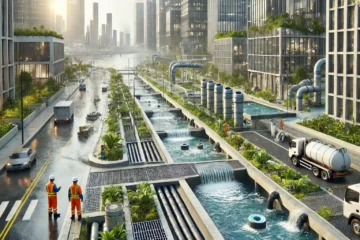Smart Civil Construction in Saudi Arabia: Pioneering a Futuristic Landscape
Saudi Arabia is embracing transformative changes in the field of civil construction, driven by the Kingdom’s ambitious Vision 2030. The nation aims to diversify its economy and establish itself as a global hub of innovation, sustainability, and advanced technology. Smart civil construction plays a pivotal role in this mission, integrating cutting-edge technologies and eco-friendly practices to create intelligent infrastructure and urban environments.
This blog explores the concept of smart construction, its applications in Saudi Arabia, and its impact on the construction industry and society.
What is Smart Civil Construction?
Smart civil construction involves the use of advanced technologies, data-driven methodologies, and innovative materials to enhance the design, construction, and maintenance of infrastructure. These technologies aim to optimize resource efficiency, improve safety, and deliver sustainable solutions.
Key Features:
- Integration of digital tools like Building Information Modeling (BIM).
- Use of Internet of Things (IoT) for real-time monitoring.
- Adoption of sustainable and recyclable materials.
- Implementation of Artificial Intelligence (AI) and robotics.
Key Smart Construction Projects in Saudi Arabia
1. NEOM: A Futuristic Smart City
NEOM is a $500 billion mega-city project that epitomizes the concept of smart construction. Located in northwestern Saudi Arabia, it aims to be a beacon of sustainability and technological innovation.
- Key Features:
- Use of renewable energy for 100% power needs.
- Advanced AI systems for managing city infrastructure.
- Flying taxis, automated vehicles, and smart urban planning.
- Integration of IoT to monitor environmental and urban systems in real-time.
2. The Line
Part of the NEOM initiative, The Line is a revolutionary urban planning project designed to house 9 million people in a linear city stretching 170 kilometers.
- Innovations:
- Zero-carbon infrastructure powered by renewable energy.
- Modular construction techniques for rapid development.
- AI-powered smart systems for seamless transportation and energy management.
3. Qiddiya: Entertainment and Cultural Hub
Qiddiya is an entertainment, sports, and cultural city near Riyadh, integrating smart construction to offer state-of-the-art facilities.
- Technological Highlights:
- Advanced construction methods for large-scale sports facilities.
- Smart traffic and crowd management systems.
- Sustainable building designs to reduce environmental impact.
4. Red Sea Project
The Red Sea Project focuses on sustainable tourism, with smart construction techniques ensuring minimal disruption to the environment.
- Sustainability Measures:
- Use of eco-friendly materials and designs.
- Smart waste management and water conservation systems.
- IoT-based monitoring to protect marine life and biodiversity.
Smart Technologies in Civil Construction
1. Building Information Modeling (BIM)
BIM is a cornerstone of smart construction, enabling the creation of detailed 3D models for planning, designing, and managing construction projects.
- Benefits:
- Improved collaboration among stakeholders.
- Real-time data integration for better decision-making.
- Reduced errors and construction delays.
2. Drones and Robotics
Drones are used for site surveys, progress monitoring, and safety inspections, while robotics assist in automated construction tasks.
- Applications:
- High-precision excavation and bricklaying.
- Inspection of hazardous areas.
- Monitoring large-scale projects like NEOM and Qiddiya.
3. Internet of Things (IoT)
IoT enables real-time monitoring and management of construction sites through interconnected sensors and devices.
- Use Cases:
- Tracking equipment and material usage.
- Monitoring structural health.
- Optimizing energy consumption.
4. Artificial Intelligence (AI)
AI aids in predictive analytics, project planning, and optimizing construction schedules.
- Capabilities:
- Identifying potential risks and delays.
- Improving resource allocation.
- Enhancing worker safety through hazard detection.
5. Sustainable Construction Materials
Saudi Arabia is investing in innovative materials such as:
- Self-healing concrete: Reduces maintenance costs and enhances durability.
- 3D-printed materials: Speeds up construction while minimizing waste.
- Energy-efficient insulation materials: Improves sustainability in buildings.
Challenges and Opportunities
Challenges:
- High Initial Costs: Implementing smart technologies requires significant upfront investment.
- Skilled Workforce Shortage: Demand for specialized expertise in AI, robotics, and IoT is growing.
- Regulatory Frameworks: The need for robust policies to govern smart construction practices.
Opportunities:
- Economic Diversification: Smart construction aligns with Vision 2030, creating new industries and job opportunities.
- Sustainability Goals: Contributing to global climate goals through green and energy-efficient buildings.
- Technological Leadership: Establishing Saudi Arabia as a leader in smart urban planning and construction.
Future of Smart Civil Construction in Saudi Arabia
Saudi Arabia’s commitment to innovation and sustainability signals a promising future for smart construction. The integration of advanced technologies, combined with a focus on eco-friendly practices, ensures that the Kingdom will lead in creating cities and infrastructure of the future.
Key Predictions:
- Widespread adoption of AI and robotics in construction processes.
- Expansion of smart city concepts beyond NEOM and The Line.
- Development of global partnerships to foster innovation in smart technologies.
Conclusion
Saudi Arabia is setting a global example with its bold investments in smart civil construction. Projects like NEOM, The Line, and Qiddiya showcase how technology and sustainability can redefine urban living and infrastructure. As these initiatives unfold, the Kingdom is poised to lead the world into a new era of construction, aligning technological advancements with environmental stewardship and human well-being.


